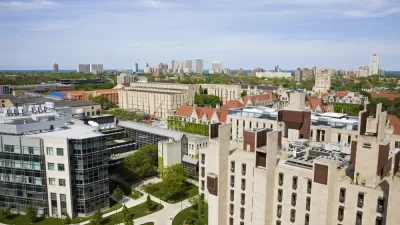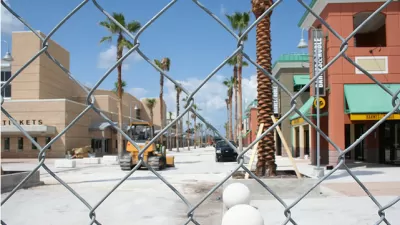Higher Education

Community Colleges: A Pathway for Native Hawaiian Achievement and Growth
The University of Hawaiʻi Community Colleges provide Native Hawaiian students with transformative educational experiences, integrating academic success, cultural identity, and strong community support to help them find purpose and thrive.

Planning Your Planning Degree
In the Northern Hemisphere, many students are starting urban planning degree programs. How can students position themselves for a productive and meaningful education in planning.

Coronavirus College Clusters Stress Town and Gown Relationship
College towns that have been observing public health guidelines and seen relatively few COVID-19 cases are now seeing infections spike as young people return to take classes. The New York Times has been tracking cases in colleges and college towns.

Universities See a Real Estate Upside in Merging with Smaller Schools
Larger universities, like Boston University, have begun swallowing up smaller schools that offer new students and a goldmine of real estate in dense urban areas.

The University and The City: Location and Structure
Institutional structure and culture can matter as much as location to the success and survival of urban universities.

The Future of Higher Education: Location, Location, Location
Despite the improving economy, the outlook for the higher education sector is still poor, especially between the endowment haves and have-nots. Another factor playing a critical role in the success or failure of institutions: their location.
New York Escalates Academic Building Boom
With nearly $10 billion in construction expected over the next five years (in addition to the $4.2 billion spent over the last five), New York City is in the midst of a higher education building boom being led by investment in science and technology
Planning for Obsolescence
As college becomes less affordable, alternatives to the traditional four-year model have been making inroads, leading some to question its lasting viability. If universities struggle, it will impact not only campuses, but cities, as well.

The Costs of the Higher Education Building Binge
After a decade-long construction arms race at the nation's institutions of higher education, The New York Times looks at what happens when the creditors come calling.
Why Reliance on 'Eds and Meds' Is Misguided
A growing list of cities are banking their economic development on the medical and educational sectors, which have consistently grown over the past few decades. Aaron Renn examines why overreliance on eds and meds is problematic.
DC Planning Office Seeks To Restrict Georgetown Enrollment
Washington DC's office of planning will begin restricting Georgetown's enrollment if the university does not manage to provide housing for 100% of its undergraduates by 2016.
5 Major Factors Behind America's Strongest Cities
Derek Thompson reports on the twenty strongest metro areas and the major factors behind their success in recovering from the recession. He concludes that the country "did not experience an even, cross-country recession."
Defining the Planning Skill Set: Resources for Students
At the beginning of semester students are signing up for classes and planning their degrees. Lately, a question I have been asked quite frequently is which classes will make new planners most employable? Students ask if computer aided design or GIS will be key. However, surveys of planning practitioners show that a far more basic set of skills is important—skills in communication, information analysis and synthesis, political savvy, and basic workplace competencies and attitudes. Below, I highlight three of these studies from across three decades:
The City, the College and the Hospital
This article from Governing looks at the role of higher education and medical facilities in keeping urban areas alive.
A Neotraditional Building Boom on Campus
Across the U.S., dozens of colleges and universities are planning or building major campus expansions. However, unlike the 1990s which saw gleaming bioscience research facilities appear on campuses, the new construction is calculated to help attract and retain faculty and students with amenities for living and shopping. Almost without exception, these projects are in a strictly neotraditional design mold.
Urban Design for Planners 1: Software Tools
This six-course series explores essential urban design concepts using open source software and equips planners with the tools they need to participate fully in the urban design process.
Planning for Universal Design
Learn the tools for implementing Universal Design in planning regulations.
Heyer Gruel & Associates PA
JM Goldson LLC
Custer County Colorado
City of Camden Redevelopment Agency
City of Astoria
Transportation Research & Education Center (TREC) at Portland State University
Camden Redevelopment Agency
City of Claremont
Municipality of Princeton (NJ)


































